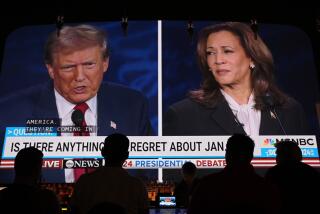Corporations’ Election Role Curbed : High Court: The justices say states may prohibit businesses from running ads backing candidates. Such spending is permitted in California.
- Share via
WASHINGTON — The Supreme Court, attacking the “corrosive effect” of corporate money in politics, ruled Tuesday that states or the federal government may forbid corporations to run advertisements in support of political candidates.
The 6-3 ruling upheld laws in 20 states, as well as federal election rules, which severely restrict corporate participation in politics.
The decision blunts an effort by business interests and conservative legal activists to strike down corporate spending limits as violations of the First Amendment’s free speech guarantee. In unusually heated dissents, three appointees of former President Ronald Reagan accused the court majority of endorsing “censorship” of the corporate message.
California limits individuals and corporations to cash contributions of $1,000 per political candidate, but it puts no limit on corporate funding of advertisements for candidates.
The 1976 Michigan law upheld Tuesday forbids corporations to support a state political candidate, either through direct funding or “independent expenditures,” like advertisements. Since 1907, federal law has prohibited corporate involvement in federal elections.
“If the decision had gone the other way, it would have opened a huge hole in the law and allowed corporate and labor union money to pour into election campaigns,” said Fred Eiland, spokesman for the Federal Election Commission.
Four years ago, the high court tried to carve out a narrow exception to the general ban on corporate involvement in politics. On a 5-4 vote, the justices ruled that a small anti-abortion group in Massachusetts--although incorporated--could support political candidates because it was not like a true corporation.
In dissent, Chief Justice William H. Rehnquist said that the ruling would sow confusion in lower courts, and his prophecy soon proved correct.
The Michigan Chamber of Commerce is a nonprofit corporation that gets funding directly from corporate giants like General Motors Corp., Ford Motor Co. and Chrysler Corp. In 1985, the chamber ran an ad in the Grand Rapids Press in support of a Republican candidate for the Legislature. This was a clear violation of the 1976 Michigan law.
But, in 1988, the U.S. 6th Circuit Court of Appeals ruled the law unconstitutional on a 2-1 vote. It cited the case of the Massachusetts anti-abortion group and said that the Michigan chamber was a “non-traditional corporation” whose purpose is “to disseminate economic and political ideas and not to amass capital.”
Lawyers for the state appealed, arguing that this ruling, if upheld, would permit major corporations to use the chamber as a way to funnel money into political campaigns.
The case (Austin vs. Michigan Chamber of Commerce, 88-1569) created an unusual split on the court. Joining to uphold the state law were conservatives Rehnquist and Justice Byron R. White and the four liberals--Justices William H. Brennan Jr., Thurgood Marshall, Harry A. Blackmun and John Paul Stevens.
The Michigan law “reduces the threat that huge corporate treasuries . . . will be used to influence unfairly the outcome of elections,” Marshall wrote for the court.
Justice Antonin Scalia read a lengthy and biting dissent from the bench. “The premise of our system is that there is no such thing as too much speech,” he said. The voters are entirely free to ignore the chamber’s newspaper ad, he said.
Moreover, the Michigan law permits labor unions to promote candidates, which suggests that the Legislature was willing to give one side extra influence in state politics, Scalia said.
Justices Anthony M. Kennedy and Sandra Day O’Connor filed a separate dissent. Kennedy called the Michigan law a “censorship scheme” that is “repugnant to the First Amendment and contradicts its central guarantee--the freedom to speak in the electoral process.”
Common Cause, the citizens’ lobby, applauded the court’s ruling. A melange of liberal and conservative groups had urged the court to uphold the principle of free speech for corporate entities.
More to Read
Get the L.A. Times Politics newsletter
Deeply reported insights into legislation, politics and policy from Sacramento, Washington and beyond. In your inbox twice per week.
You may occasionally receive promotional content from the Los Angeles Times.











